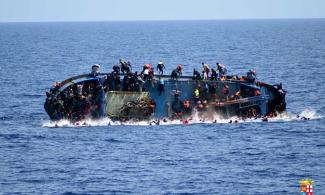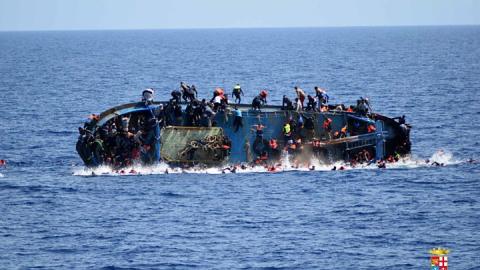
In order to aid humane mobility as the EU claim to be interested in, both continental bodies should collaborate on connecting Africa and Europe with a rail line. This could exterminate reported cases of organ transplant, illicit arms flow and other despicable trade propagated by the negligence of the Sahara route by concerned government institutions. Merkel is running, can we meet her half way?

She is concluding a tour to three influential migrant breeding grounds in Africa: Senegal, Ghana and today, Nigeria. Her steps are quickened by the fiery barbs of high-ranking members of Italy’s leading government coalition, Five-Star Movement and her own Interior Minister, Horst Seehofer.
For 12 years now, Merkel has held on to the Chancellorship of Germany; Brussels, headquarters of the European Union, does send a strong emissary to come stem the tide of ‘human cargoes’ pleading to berth at the reluctant ports of an angry Italy. For years now, Italy has been the hub of rescued illegal migrants seeking the ‘better life’ in Europe. Spain is farther back in second and Greece takes the bronze position. The present government in Rome is fed up and are aggressively combing for solutions to stop the influx. They have asked the EU, powered by the German engine, to redistribute the survivors that straggle into their various coastal towns.
The wheels in Berlin are creaking under the weight of humans that blitzed into its territories from the violence-ridden Middle-East.
On March 10, 2018, the seas were calm; people smugglers in Libya took advantage of the fair weather to send a stream of dingy held-up by balloons into the unforgiving Mediterranean.
While the tide of nature is favourable, the wave of events is pitted against the crowded unseaworthy vessels hoping to drift into international waters off the Libyan coast. Last year, Marco Minniti, the then interior Minister of Italy, was reported to have reached a deal with smuggling gangs in Sabratha, Libya. That agreement was followed up with the upgrade of the defunct Libyan coast guard. The dethronement of Qadhafi had weakened the capacity of Libya’s security profile, making the offloading of humans on the Mediterranean a piece of cake.
Three of four boats are cut-off from reaching the safety of rescue vessels. The fourth drifts close to the reach of rescue vessel – Aquarius.
It is loaded with more than 120 humans. More than half of them are said to be Nigerians. A Palestinian is thrown overboard for suggesting that they seek help from a Libyan coastguard vessel nearby instead.
“All but one of the five balloons holding the boat up was either completely deflated or deflating and there were still about 120 people inside the boat, so a very, very precarious condition,” one of the rescuers, Max Avis told Reuters. By mid-June, Aquarius had picked up 629 people from deflating inflatables, but it had nowhere to duck
Present Italian Interior Minister, Matteo Salvini, described nongovernmental organisations (NGOs) who run rescue vessels like these, as “taxis for migrants who otherwise would have little chance of reaching Italy”.
He closed off Italy’s ports to Aquarius and a bitter bickering ensued in the EU. Merkel’s policies have never faced a test this stern and so, she runs to call on Nigeria and its President, Muhammadu Buhari, or so it seems.
The EU has deployed different measures at specific periods in search of a long-term solution to the flooding of its coastal borders. In 2015, it set up the EU Emergency Trust Fund for Africa. As at January 2018, this scheme had initiated around 117 programmes at a cost of €1.9 billion. Its objective is to help tackle the root causes of migration. Its focus areas are the Sahel region, the Lake Chad, the Horn of Africa and North Africa. The fund has targeted communities in border towns, women, children and other vulnerable populations. In June of 2018, it committed €467 million to new actions on unemployment among others.
“We continue working to save lives, provide safe and dignified returns and legal avenues, and tackle the root causes of migration, by creating jobs and growth. With the UNHCR, we have evacuated 1,287 refugees from Libya to Niger, who need to be resettled swiftly now.
“With the International Organisation on Migration (IOM), we helped 22,000 people to return home and provide reintegration assistance. Today’s additional commitments will further consolidate our work towards managing human mobility – in a humane, secure and dignified way together with our partners,” Federica Mogherini, High Representative of the European Union for Foreign Affairs and Security Policy, said at the launch of the new initiatives.
Besides the trust fund, which lends support to Northeastern Nigeria, The EU also runs the Mobility Partnership Facility (MPF). Under this programme which was initiated in January 2016, EU gives assistance to certain partner countries under two programmes; a mobility partnership and a Common Agenda on Migration and Mobility (CAMM).
Nigeria, Ethiopia and India, benefit from this fund.
The funds help with advice on how to become a legal migrant, tackling criminal gangs involved in human trafficking, smuggling and terrorism. Back home in Europe, over €10.8 billion has been disbursed to countries hosting ‘irregular migrants.’
Yet, it is the seemingly brutal deal Minniti helped the EU broker with Libya’s coastguards that brought down the human tide on the Mediterranean. As Interior Minister, Minniti helped refurbish seven vessels for naval security and bonded several fractious rival groups. Quoting IOM, Washington Post says the new coast guards intercept one in every three migrants crossing the Mediterranean, an improvement from one in eight last year. As at June, the population of persons reaching Italy had dropped by 70 per cent.
This policy is far more attractive to Salvini, who is said to have told NGO vessels like Sos Mediterranee, Proactiva Open Arms and Sea-Watch 3, to allow the Libyan security details send back the asylum seekers to Libya for onward return to their country.
There goes the conflict. While trying to improve conditions in the home-base of migrant countries, the EU is reportedly working with gangs in Libya, who run deportation camps famous for dehumanising and enslaving migrants.
Now that Merkel has seemingly run for help, it is in the interest of the African Union, who by the way, is still working on a draft migration policy, to negotiate sustainable ways of governing towns that border the Sahara and coastal communities. Littered across several African countries, are forces from EU countries, such as the French-dominated Minusma force fighting militancy in the Sahel. The EU should apply its Emergency Trust Fund to building security and telecommunication collaborations with partner countries to secure all border towns along migrant routes. The European Union bloc has an external border agency known as Frontex that helps the economic league collate relevant data on irregular migration hot spots. An effective coordination like Frontex is desperately needed in Africa if migration is to reduce.
In order to aid humane mobility as the EU claim to be interested in, both continental bodies should collaborate on connecting Africa and Europe with a rail line. This could exterminate reported cases of organ transplant, illicit arms flow and other despicable trade propagated by the negligence of the Sahara route by concerned government institutions.
Merkel is running, can we meet her half way?